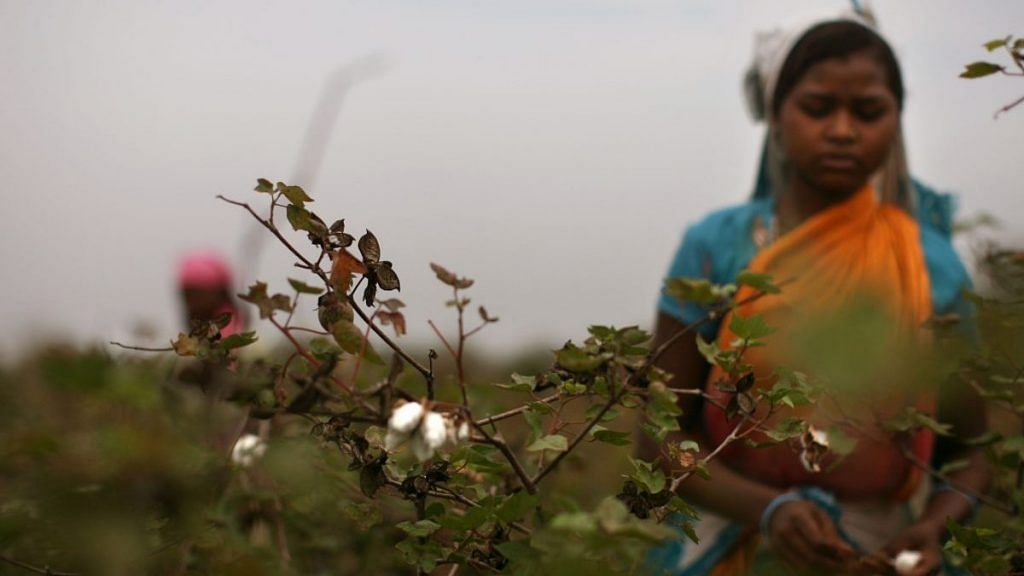Mumbai: After several instances of farmers in Maharashtra sowing unauthorised varieties of genetically modified (GM) cotton to openly defy the moratorium on the technology, a group of women farmers in Vidarbha have now decided to come together to follow suit.
On Sunday, women farmers led by Maya Patil Pusadekar, a farmer herself, will plant the unapproved herbicide tolerant (HT) Bt cotton at Pusada village in Vidarbha’s Amravati district on Pusadekar’s land.
The HT seeds are genetically modified to tolerate some specific herbicides. This allows for these herbicides to kill the surrounding weeds but leave the cultivated crop intact.
Farmers have been furtively using such unapproved herbicide-tolerant seeds to save expenditure on manual labour for weeding, but over the past few days, growers across the state have been openly planting these seeds to defy the ban and demand genetically modified technology. It started with one farmer, Lalit Bahale from Akoli Bahadur village in Akola district, who sowed HT cotton seeds last week in the presence of about a thousand other farmers.
After Bahale, a handful of other farmers including Mahadev Khamkar from Anandwadi village in Ahmednagar district, and Amol Masurkar from Akola district’s Adgaon Budruk village, also sowed HT Bt cotton declaring their defiance on social media.
Also read: Don’t penalise farmers for pro-GM crop protest, address their concerns instead
Symbolic HT Bt sowing on 1/4th acre
“About 150 women are likely to be present for the agitation on Sunday. The women will symbolically sow HT cotton seeds on about one fourth acre land,” Rajabhau Pusadekar, Maya Pusadekar’s husband, told ThePrint.
“Before the sowing the women leading this agitation will hold a session with the participating women farmers, giving them information on what GM technology is, its benefits and so on.”
Maya was unavailable to speak because she was out touring neighbouring villages to canvas for support for Sunday’s agitation, he added.
The women farmers plan to give a written intimation of their intention to plant HT Bt cotton seeds to the taluka agriculture officer to formally record their protest.
Maya is a member of Shetkari Sanghatana, like Bahale, who launched the recent wave of pro-GM protests in Maharashtra by sowing HT cotton on his two-acre land.
The Shetkari Sanghatana is an organisation founded by former Rajya Sabha member and farmer leader Sharad Joshi, which has always been in favour of GM technology. The organisation has been gathering farmers’ support for GM technology in agriculture by holding workshops and discussions on the technology across Maharashtra and reaching out to them through social media for solidarity.
Debate over GM crops
There is ample opposition to introducing GM food in India with activists, environmentalists and politicians raising fears of it adversely affecting food safety and biodiversity in the country.
However, its proponents have stressed the increased yield, lower use of pesticides and thus lower production cost for farmers as advantages of having GM technology.
Currently, cotton is the only GM crop that the government has allowed to be sold in India. There were attempts to commercially release Bt Brinjal, a GM variety of the vegetable, but former environment minister Jairam Ramesh imposed a temporary moratorium on it.
Last week, the Union environment ministry sent a notice to Maharashtra chief secretary Ajoy Mehta, urging the state government to investigate the sowing of unauthorised GM seeds and take action.
So far, the state government has taken a sample of the seeds that Bahale planted in Akola and given it to a laboratory to ascertain whether it is an unauthorised GM strain. The collector’s office is still awaiting the laboratory report.
Also read: 2 more Maharashtra farmers sow GM cotton, say it’s their ‘civil disobedience movement’
